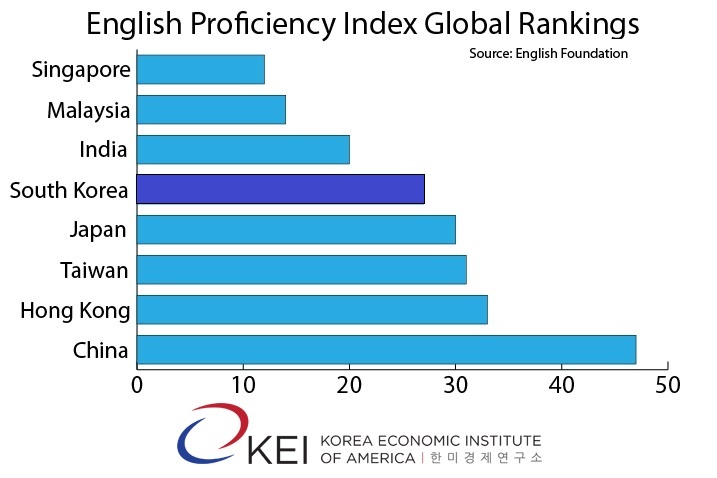The Peninsula
Not as Easy as A-B-C? Looking at English Proficiency in South Korea

By Juni Kim
Even a cursory glance at the South Korean education system reveals a fervent interest for English learning in both public and private spheres. According to a 2015 government survey by Statistics Korea and the Korean Ministry of Education, spending on private education totaled 17.8 trillion won (about US $15 billion) last year. English alone makes up one third of these private education costs, which amounts to the largest per capita spending on private English education in the world.
Whether South Korea’s hefty appetite for English has led to effective results remains uncertain. The 2015 EF English Proficiency Index Rankings placed South Korea 27th out of 70 nations measured worldwide. The top-ranked nations are predictably comprised of Western European countries that benefit from more common linguistic roots with English. Countries like Sweden, the Netherlands, Norway, and Denmark speak native languages classified by the Foreign Service Institute as a Category 1 language, which is for languages most closely related to English. Korean, along with other Asian languages like Japanese and Mandarin, is classified as a Category 5 language, which is for languages with the most significant differences to English.
Although Korea’s global ranking may imply that South Korean English proficiency has a long way to go, the picture looks more favorable for Korea when framed against other countries that natively speak other Category 5 languages. The EPI ranks Japan as 30th, Taiwan as 31st, Hong Kong as 33rd, and China as 47th on their global rankings, which are all below South Korea’s ranking. When compared to only other Asian nations, South Korea ranks 4th out of 16 nations, with only Singapore, Malaysia, and India ranked ahead. Considering that these three countries have a shared history of British colonialism and have also recognized English as an official national language, South Korea has performed well in English ability relative to the Asian region.
Despite these favorable rankings in Asia, the authors of EPI noted that South Korea’s “English fever” has not led to a significant increase in Korean adult English proficiency, which has stagnated in recent years. In fact, South Korea has steadily dropped in rankings since EPI began tracking English proficiency in 2011. They viewed the thriving private English education business as a natural result of inadequacies in South Korea’s public English education. KEI’s own Jenna Gibson wrote last year about the Korean Ministry of Education’s plan to improve English education, which might not be as effective as they hoped.
Even though the path for higher English proficiency remains unclear, South Korea’s interest and spending in English is unlikely to disappear in the near future. Spending on English private education took a slight 1% percent drop from 2014 to 2015 and a recent poll of South Korean parents reported that over 93% of respondents did not want to cut spending on their children’s private English courses. For many Koreans, English remains a prized skill to improve employment opportunities in the competitive Korean job market.
What may abate South Korea’s “English fever” is the increasing national interest in learning Mandarin. With China being South Korea’s largest trading and tourism partner, Koreans have quickly caught on to the importance of Mandarin proficiency. While the number of South Korean students in U.S. universities has dipped in recent years, the number of students in Chinese universities has more than tripled since 2003. The Seoul Metropolitan Government has also publicly discussed the inclusion of Chinese on city signs, which already display English, to accommodate the large number of tourists from China.
Regardless of which language becomes more popular among Korean students in the future, South Korean interest in language learning is telling of the national desire to become more integrated with the global scene.
Juni Kim is the Program Manager and Executive Assistant at the Korea Economic Institute of America. The views expressed here are the authors alone.
Photo from Kim Daram’s photostream on flickr Creative Commons.
